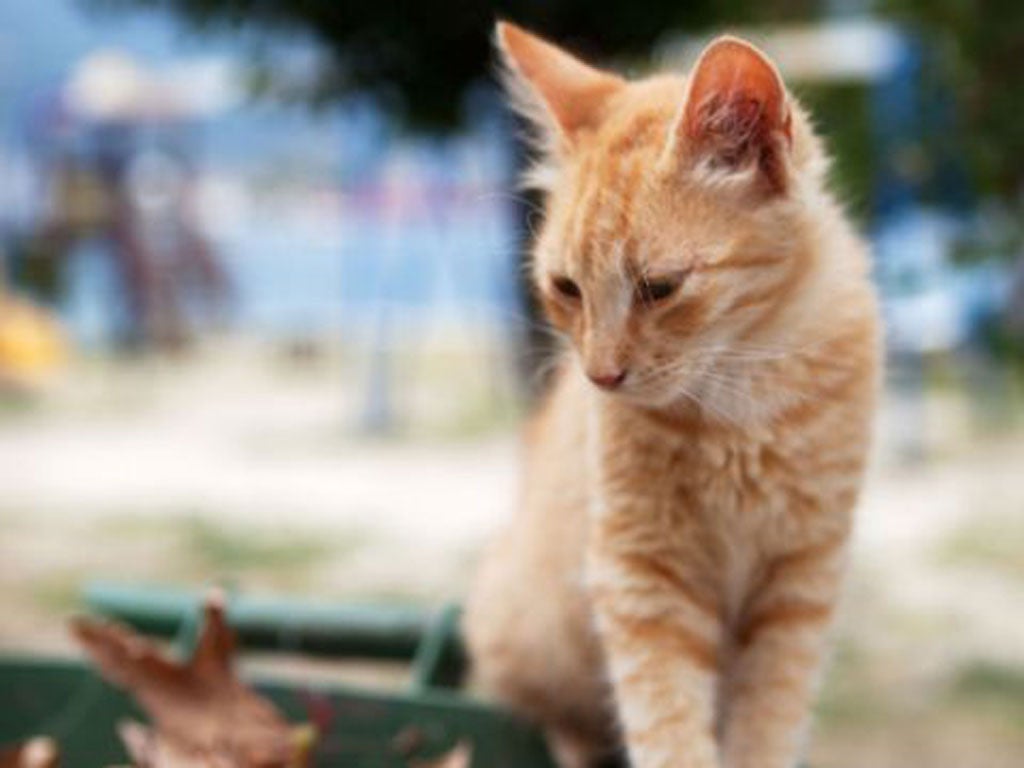Cruel for cats: Hard times for humans lead to an epidemic of stray pets
People are letting cats breed to sell the kittens, but if they aren't sold they are often just abandoned

Your support helps us to tell the story
From reproductive rights to climate change to Big Tech, The Independent is on the ground when the story is developing. Whether it's investigating the financials of Elon Musk's pro-Trump PAC or producing our latest documentary, 'The A Word', which shines a light on the American women fighting for reproductive rights, we know how important it is to parse out the facts from the messaging.
At such a critical moment in US history, we need reporters on the ground. Your donation allows us to keep sending journalists to speak to both sides of the story.
The Independent is trusted by Americans across the entire political spectrum. And unlike many other quality news outlets, we choose not to lock Americans out of our reporting and analysis with paywalls. We believe quality journalism should be available to everyone, paid for by those who can afford it.
Your support makes all the difference.Unemployment is high. Inflation is crippling. And now there is growing evidence for another dark consequence of the double-dip recession: an epidemic of stray cats.
Growing numbers of pet owners, struggling with the rising cost of living, are abandoning animals that they cannot afford or saving money by not neutering their cats.
At the same time, a network of amateur breeders has emerged. They exploit internet trading sites to sell kittens to supplement their income. The result has been an explosion in the feline population, leading to an unprecedented number of abandoned and feral cats living wild on the streets of towns and cities.
Cat Protection, the leading cat welfare charity, said that the number of unwanted cats has hit an all-time high, at the same time as the number of potential homes has plummeted. Shelters throughout the country are running out of space and pet owners report that "gangs" of feral cats are invading neighbourhoods, often fighting or breeding with domestic animals.
Although nobody knows the exact number of cats living in the UK, Cat Protection said that reports of stray cats, or calls from people wanting to give up their cats, were up by a third since 2009.
Between July and September this year alone, the charity estimates that more than 20,000 people reported a stray cat to them, or gave up an unwanted cat. The RSPCA also reported an increase in calls, from 8,500 calls in 2009 to nearly 11,000 last year.
"Since the UK entered recession we have received many more requests from people to take in their cats, with owners saying they are losing their jobs, their homes, or moving into rented accommodation," said Kate Bunting of Cat Protection. "It can be very difficult for us to take in all these cats, especially at short notice."
Having adopted a wild lifestyle, cats become prolific breeders. One unneutered female cat can produce 18 kittens in a year and in only five years could have 20,000 descendants.
Elke de Vries, a field worker from central London cat shelter Cat Action Trust 1977, said amateur breeders were contributing to the surge in numbers. "People are letting their cats breed indiscriminately in order to sell the kittens. You can fetch £50 per kitten on websites such as Gumtree, and with four or five kittens in a litter they think they can get a quick income.
"But if these kittens aren't sold, they are often just abandoned, and it's these cats that are populating the country. We hear of people with gardens and kitchens full of cats that they can't sell. The situation is really, really grim. They are everywhere now.
"Feral tom cats are usually not neutered. They have to fend for their food. They intrude into kitchens. They are quite often vagrant and they smell a female miles away. One female can attract many tom cats. Usually there can be as many as six or eight cats which fight each other for that female."
Steve Marshall, founder of Caring for Cats, a shelter in Hull, said that their centre had been continuously full for the past two years, and was now operating a waiting list.
"Half of our calls are from people reporting cats that have turned up at their homes, either having kittens in the garden, or hanging around outside the front door, beating up their domestic cat," he said.
"A big part of the problem is people not getting cats neutered. But there isn't really an excuse. It costs less than £60 to do. But if you are struggling to put food on the table it might not be a priority. Unfortunately people might not be seeing the bigger picture that if you don't neuter, you will have dozens of cats before long."
Shelters have begun rounding up feral cats, neutering them and then returning them to the streets, because of a lack of available homes. If a cat is born wild, it is almost impossible to domesticate, Ms de Vries said.
"We desperately need people to come forward to adopt," said Kate Bunting from Cat Protection.
"We would also urge people to get their cats neutered as soon as possible, because it is the most effective way of controlling numbers of unwanted cats and kittens."
Cat numbers
24,000 The number of calls to the RSPCA and Cat Protection reporting a stray or unwanted cat between July and September this year.
18 The number of kittens a female cat can have in a year.
£60 The average cost of neutering a cat.
Join our commenting forum
Join thought-provoking conversations, follow other Independent readers and see their replies
Comments